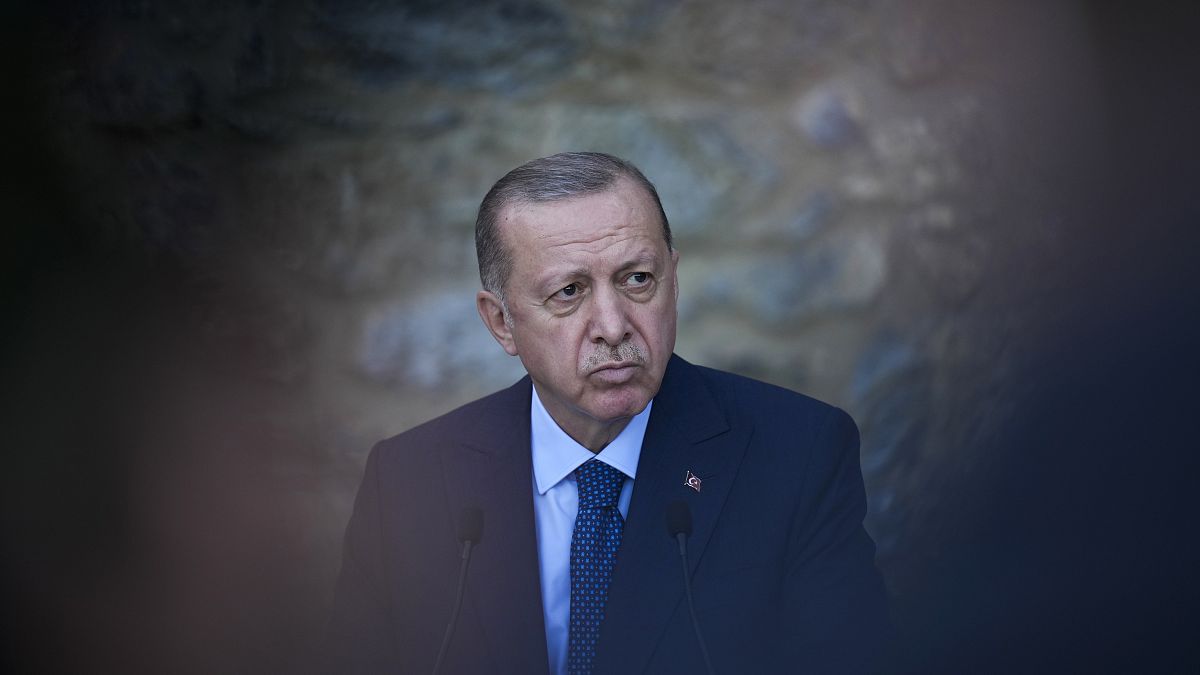The 10 ambassadors expelled had called for the release of businessman and philanthropist Osman Kavala.
Turkish President Recep Tayyip Erdogan backtracked on an earlier threat to expel 10 foreign ambassadors -- including seven from Europe -- after they supported the release of a jailed philanthropist.
“We believe that these ambassadors, who have fulfilled their commitment to Article 41 of the Vienna Convention, will now be more careful in their statements,” he said in televised remarks following a three-hour Cabinet meeting in Ankara.
The 10 ambassadors had called for the release of businessman and philanthropist Osman Kavala — jailed in 2017 despite having not having been convicted of a crime — in a joint statement last week.
Erdogan had said on Saturday that the statement was an “impudence” and ordered the ambassadors to be declared persona non grata.
“I gave the instruction to our foreign minister and said ‘You will immediately handle the persona non grata declaration of these 10 ambassadors,’” Erdogan told supporters during a rally in Eskisehir.
“They will recognise, understand and know Turkey. The day they don’t know or understand Turkey, they will leave.”
The diplomats, including the ambassadors of France, Germany, Netherlands, Canada, Denmark, Sweden, Finland, Norway, New Zealand, and the US, were summoned to the foreign ministry on Tuesday.
Kavala, 64, was acquitted last year of charges linked to nationwide anti-government protests in 2013, but the ruling was overturned and joined to charges relating to a 2016 coup attempt.
International observers and human rights groups have repeatedly called for the release of Kavala and Kurdish politician Selahattin Demirtas, who has been jailed since 2016.
They say their imprisonment is based on political considerations. Ankara denies the claims and insists on the independence of Turkish courts.
The European Court of Human Rights called for Kavala's release in 2019, saying his incarceration acted to silence him and wasn't supported by evidence of an offence. The Council of Europe says it will start infringement proceedings again Turkey at the end of November if Kavala is not released.
European governments condemned Turkish threat
German government spokesperson Steffen Seibert said on Monday that he had taken note "with concern and also with incomprehension" of the Turkish president's statements. He stressed that Berlin had not yet received any "official communication" from Ankara.
Finnish Prime Minister Sanna Marin told public broadcaster YLE on Sunday that "this is a tough reaction" from Erdogan.
“This is a very regrettable situation. We’ve considered it important that the decisions of the European Court of Human Rights are respected and complied with, and therefore have called for the release of this human rights activist,” Marin said.
She also said that Helsinki was engaged in a dialogue with Turkish officials and was waiting for further information from Ankara before “drawing any conclusions”.
By Sunday afternoon, none of the four Nordic countries had received an official notification from Turkey's foreign ministry on their ambassadors being labeled with a persona non grata status.
“However, I can state that we’re in close contact with our friends and allies about the case,” Danish Foreign Minister Jeppe Kofod told broadcaster TV2 late Saturday.
Former EU ambassador to Turkey, Marc Pierini, told Euronews that Erdogan is trying to turn attention away from his domestic woes.
"If you look closely, the Lira is falling consistently due to the policies imposed by the President and the opinion polls for the president and his party and the coalition with nationalists are very bad," Pierini said on Monday. "So you have a very big tension inside and a centuries-old recipe that when it goes bad inside, you strike outside. This is what happened on Saturday."
The former ambassador also said that using external factors to distract from problems at home will only work for so long.
"Despite the fact that the Turkish autocratic regime controls most of the media, people are extremely well informed and in the end their vote, whenever the election comes in June 2023 - the normal date - earlier or later, who knows, they will look at one thing, like any voter...am I better off today than I was last year or the year before. And this is what will make a difference.
"You now have massive unemployment in Turkey. People understand instinctively that disruptive moves with your biggest trading partners and investors, such as the European state or defense partners like the US, are not good for Turkey, but this is up to the voters," Pierini added.
A declaration of persona non grata against a diplomat usually means that an individual is banned from remaining in their host country.
